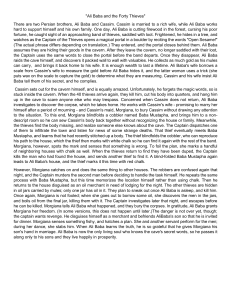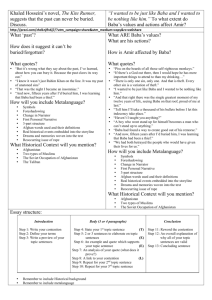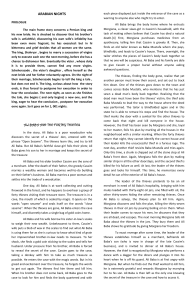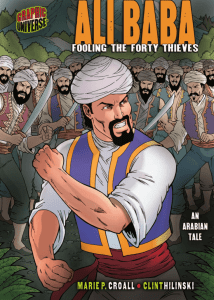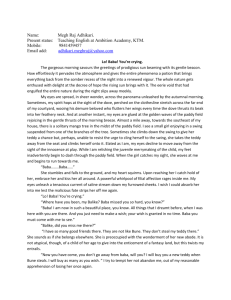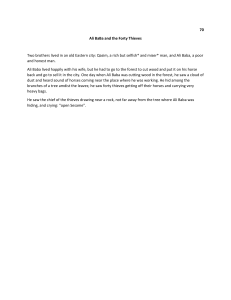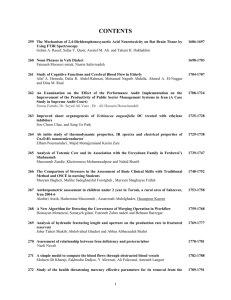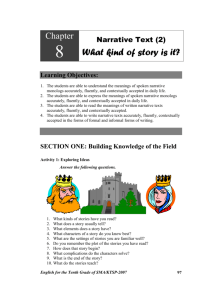Story Title: The Mermaid Wife
advertisement
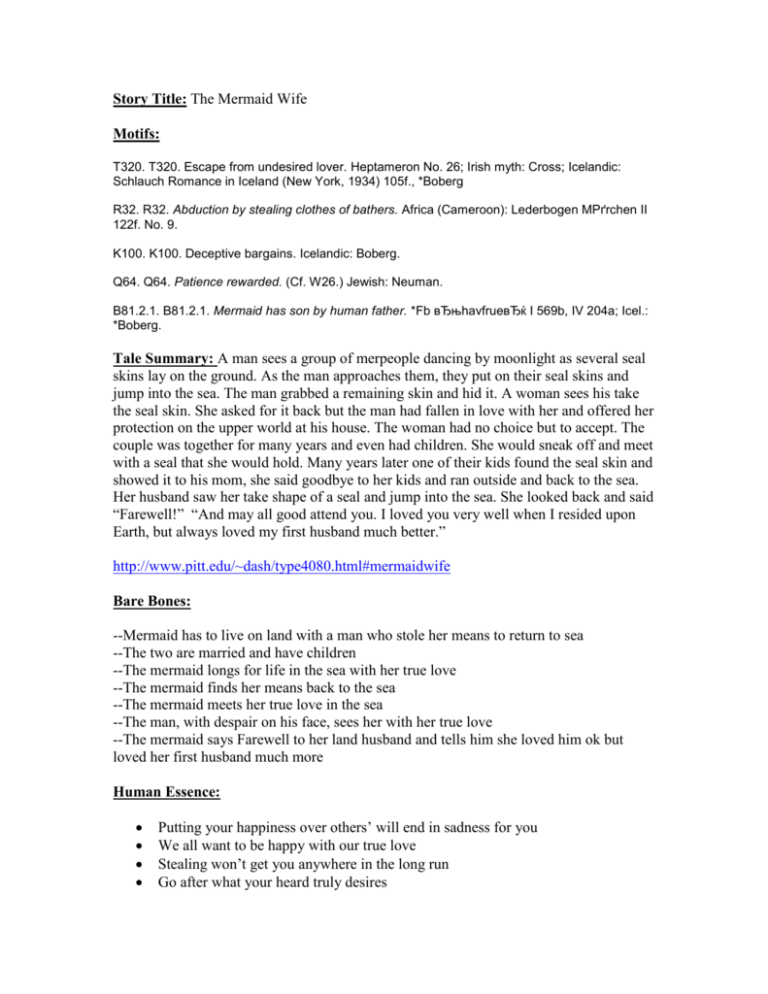
Story Title: The Mermaid Wife Motifs: T320. T320. Escape from undesired lover. Heptameron No. 26; Irish myth: Cross; Icelandic: Schlauch Romance in Iceland (New York, 1934) 105f., *Boberg R32. R32. Abduction by stealing clothes of bathers. Africa (Cameroon): Lederbogen MРґrchen II 122f. No. 9. K100. K100. Deceptive bargains. Icelandic: Boberg. Q64. Q64. Patience rewarded. (Cf. W26.) Jewish: Neuman. B81.2.1. B81.2.1. Mermaid has son by human father. *Fb “havfrue” I 569b, IV 204a; Icel.: *Boberg. Tale Summary: A man sees a group of merpeople dancing by moonlight as several seal skins lay on the ground. As the man approaches them, they put on their seal skins and jump into the sea. The man grabbed a remaining skin and hid it. A woman sees his take the seal skin. She asked for it back but the man had fallen in love with her and offered her protection on the upper world at his house. The woman had no choice but to accept. The couple was together for many years and even had children. She would sneak off and meet with a seal that she would hold. Many years later one of their kids found the seal skin and showed it to his mom, she said goodbye to her kids and ran outside and back to the sea. Her husband saw her take shape of a seal and jump into the sea. She looked back and said “Farewell!” “And may all good attend you. I loved you very well when I resided upon Earth, but always loved my first husband much better.” http://www.pitt.edu/~dash/type4080.html#mermaidwife Bare Bones: --Mermaid has to live on land with a man who stole her means to return to sea --The two are married and have children --The mermaid longs for life in the sea with her true love --The mermaid finds her means back to the sea --The mermaid meets her true love in the sea --The man, with despair on his face, sees her with her true love --The mermaid says Farewell to her land husband and tells him she loved him ok but loved her first husband much more Human Essence: Putting your happiness over others’ will end in sadness for you We all want to be happy with our true love Stealing won’t get you anywhere in the long run Go after what your heard truly desires Bibliography: Thompson, S. and Balys, Jonas, The Oral Tales of India. Bloomington: Indiana University Press, 1958, pp. 448. Eire, Carlos, M.N., From Madrid to Purgatory: The Art & Craft of Dying in SixteenthCentury Spain. Cambridge University Press, 1995. MacCulloch, J.A., Celtic Mythology. Dover Publications, Inc., 2004. Speroni, Charles, Wit & Wisdom of the Italian Renaissance. University of California Press, 1964. Story Title: Ali Baba and the Forty Thieves Motifs: H1471.1. H1471.1. Watch for thieves in the king’s garden. India: Thompson-Balys. H1556.0.1. H1556.0.1. Fidelity of servant tested. Irish myth: *Cross. H1558. H1558. Tests of friendship. Icelandic: *Boberg; India: *Thompson-Balys. W34. W34. Loyalty. Irish myth: Cross. W151. W151. Greed. Irish myth: Cross; Jewish: *Neuman; Icelandic: *Boberg; West Indies: Flowers 582. W181. W181. Jealousy. Irish myth: *Cross; Missouri French: CarriРёre; Icelandic: *Boberg; Spanish: Espinosa Jr. Nos. 142--45. L31. L31. Youngest brother helps elder. Types 516, 550; RС†sch FFC LXXVII 96; Missouri French: CarriРёre; Spanish: Espinosa Jr. No. 130; India: Thompson-Balys; Chinese: Graham. U232. U232. No place secret enough for sin. Alphabet No. 3; Wienert FFC LVI 80 (ET 458), 138 (ST 441); Halm No. 354. Tale Summary: Ali Baba, a poor and hard-working man, witnesses 40 thieves enter a secret cave. After the thieves leave, Ali Baba goes into the cave using their secret phrase, “Open Sesame!” Ali Baba discovers a plethora of riches. He took with him many bags of gold and showed them to his wife. His wife measured the gold using her sister-in-law’s measure. Ali Baba’s brother Cassim and his wife now knew of the riches because of the gold left on the bottom of the measure. Cassim made his brother tell him where to find the riches and Ali Baba, out of kindness, told him where to go. Cassim made it inside the cave but forgot the secret phrase and so was found by the thieves and killed. Ali Baba later found Cassim’s body and brought it back home along with more bags of gold. Cassim’s slave, Morgiana, became Ali Baba’s slave and proved to be very loyal. The thieves tried to kill Ali Baba twice by pretending to be merchants and but Morgiana, who was very weary of them, was able to kill the thieves before they got to Ali Baba. Ali Baba gave Morgiana to his son to marry as he was very grateful for her faithfulness to him. At the end of the year Ali Baba went back to the cave and returned home with as much gold as he could carry. He told his son of the cave of riches and now Ali Baba’s children and grandchildren will be rich to the end of their lives. http://www.pitt.edu/~dash/alibaba.html Bare Bones: --Ali Baba discovers a cave of riches and steals gold --Ali Baba’s brother Cassim finds it and gets locked in --Cassim is killed --Cassim’s slave Morgiana becomes Ali Baba’s --Morgiana kills the thieves who try to kill Ali Baba twice --Morgiana marries Ali Baba’s son as a thank you --Ali Baba’s children and grandchildren are rich to the end of their lives Human Essence: Loyalty will help you in the end Stealing may get you killed Your status does not guarantee high intelligence Anyone can be a hero Bibliography: Anderson, S.M. & Swenson, K., Cold Counsel: Women in Old Norse Literature and Mythology. Routledge: New York, NY, 2002. Told by Yafe, Leah to Yafe, Aharon, One Should Always Be Happy with His Lot. Folktales of the Jews: Tales from Arab Lands, 2011, Vol. 3, pp. 212. Translated by Keller, J.E., & Keating, C., Aesop’s Fables: With a Life of Aesop. The University Press of Kentucky, 1993. Wishosk Myths, 1905. The Journal of American Folklore, Vol., 18, No., 69, pp. 85-107. Story Title: The Sea Nymph Motifs: A427.1. A427.1. Goddess of springs and wells. In Greek myth, the nymphs were regarded as deities of springs. In Babylonian, Ishtar, the goddess of fertility had this function.--Greek: Fox 257; Persian and Babylonian: Carnoy 278. T332.1. T332.1. Woman sent by deity to tempt self-righteous anchorite. India: Thompson-Balys. J1052. J1052. Cranes disregard warnings and are killed. Wienert FFC LVI 67 (ET 315), 117 (ST 276). Q200. Q200. Deeds punished. **Encyc. Rel. Ethics s.v. “Crimes and punishments”; *DeCock Volkssage passim; Irish myth: Cross; Jewish: *Neuman. H900. H900. Tasks imposed. A personвЂ˜ s prowess is tested by assigning him certain tasks (usually impossible or extremely difficult) to be performed either to escape punishment or to receive a valuable reward. *Penzer X 330 s.v. “tests”; *Chauvin VI 200 No. 372.--Irish myth: *Cross; Breton: SР№billot Incidents s.v. “йpreuves”; Greek: Frazer Apollodorus I 184 n. 1 (Hercules), Fox 80ff. (Hercules), ibid. 98 (Theseus); N. A. Indian: **Lowie The Test Theme in North American Mythology (JAFL XXI 97ff.). Tale Summary: A fisherman is warned not to reach out to the hand of the Sea Nymph that comes to their boat at night. He does not listen and reaches out his hand. The Nymph takes him away, under the sea where he remains for three years. The fisherman is allowed to come to land and see his wife on her wedding day to another man. The Nymph instructs the man to only go to the house but not go inside. He disobeys and the Nymph destroys the house. The man gets sick and three days later, he dies. http://www.pitt.edu/~dash/abduct.html#seanymph Bare Bones: --Fisherman is warned not to touch the Nymphs hand --He touches the Nymphs hand and is taken under the sea for three years --He returns to land in hopes to see his wife who is remarrying --The Nymph instructs him to only go to the house and not inside --He disobeys and the Nymph destroys the house --The fisherman falls ill and three days later he dies Human Essence: Don’t give into temptation Follow the rules Pain of losing a spouse Male bonding and camaraderie Bibliography: Translated from the Tamil by Zvelebil, K.V., 1987. Two Tamil Folktales: The Story of King Matankama and The Story of Peacock Ravana. Bungalow Road, Jawahar Nagar, Delhi. Mackenzie, D.A., Myths of Babylonia and Assyria. Originally published in 1915. Published in 2007, Forgotten Books. Homer. Translated by Rouse, W.H.D., 1937. The Odyssey. New American Library: New York, NY.
